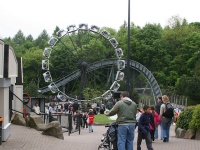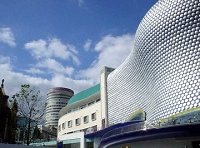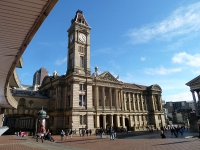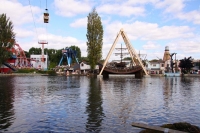City guides


Birmingham Travel Guide
Birthplace of the Industrial Revolution, Birmingham is shaking off its dreary reputation as a manufacturing city to reveal a modern, cosmopolitan hub. Situated in the geographical heart of England, the UK's second-largest metropolis is a mixed bag of cultures, dotted with a colourful array of continental eateries, modern shopping arcades, sweeping plazas, and vibrant markets.
Much of the area now covered by sprawling Birmingham was originally the northern corner of the ancient Forest of Arden. Birmingham came to life in the mid-1800s as a major manufacturing town owing to the large deposits of exploitable coal and iron nearby.
Despite heavy bomb damage during World War II's 'Birmingham Blitz', much industrial heritage is still present in 'Britain's canal city', which has even more waterways than Venice. Built over 200 years ago, the canals, which once bore the raw materials that would spawn the Industrial Revolution, are now principally used for pleasure, and provide a moody backdrop to the historic buildings, restaurants and pubs that are situated alongside the water, most notably at charming Brindley Place and the Gas Street Basin.
Birthplace of the likes of JRR Tolkien, Robert Plant, Black Sabbath, and The Streets, the Brummies have done their fair share in creative contribution. An impressive live music scene now illuminates the evenings with an exhausting plethora of options available to travellers.
Things to do in Birmingham
Idiosyncratic in its language and Kashmiri cuisine, Birmingham offers something new to travellers in England. From pubs and canals to shopping and curry, the Brummies impart an impressive spread. A student town atmosphere coupled with big city features and sightseeing attractions ensures a holiday in Birmingham makes for a rewarding UK travel experience.
A rich bounty of cuisine and culture make up the world-renowned Balti Triangle, and the curvaceous Selfridges store with its mottled futuristic 'skin' is not to be missed at the Bull Ring centre, a commercial hub that has been in use since the Middle Ages.
For a breath of fresh air, head to one of Birmingham's five Green Flag-status parks, and enjoy the shade of the city's dense oak tree cover. For those travelling to Birmingham with kids, the Cadbury's factory will delight children and cocoa lovers alike, and the Drayton Manor Theme Park will be fun for the whole family.
A host of excellent art galleries and museums promise to entertain culture vultures: the RAF Museum is interesting for history fans; the small but fascinating Museum of the Jewellery Quarter showcases a different side of the city; and the Birmingham Museum and Art Gallery boasts one of the best Pre-Raphaelite collections in the world.
Barber Institute of Fine Arts
Praised by The Observer as 'one of the finest small art galleries in Europe', the vivid red walls of the enchanting Barber Institute of Fine Arts are adorned with some of the most celebrated art from the 13th to 20th centuries. Browsing the robust artworks, visitors are treated to the timeless talents of the old masters and modern pioneers such as Monet, Manet, Gauguin, Van Gogh, and Degas. Offering a fascinating collection of paintings, drawings, prints, and sculptures, history enthusiasts can also venture into a bygone age at the coin gallery, which hosts one of Europe's finest collections of Byzantine coins. The Barber Institute's Gallery Shop is a worthy stopover for some souvenirs and gallery-related literature.

Alton Towers
Alton Towers is the UK's premier theme park aimed at the thrill-seeking and young-at-heart, and can be a welcome excursion for those who have overdosed on the culture and tranquillity of the Cotswolds. Rides with names such as Nemesis, The Blade, Wicker Man, and Oblivion are definitely not for the faint-hearted, but the park does cater for the whole family with an adventure land and farmyard for younger visitors. For those exhausted by the day's antics, Alton Towers operates its own hotel and there are plenty of spots to grab a bite to eat.
Balti Triangle
Any visit to Birmingham is incomplete without visiting the Balti Triangle, the city's unique curry capital. Originating from the large Kashmiri population, the Balti dish was officially discovered in 1976. The word 'balti' means 'bucket', and refers to the round-bottomed pan, similar to a wok, in which the dish is served. A mouth-watering stir-fried curry with an amalgamation of spices and fresh herbs, newcomers should forget their knives and forks and mop up the sauce with a wad of aromatic naan bread. Located in the Sparkbrook area, ten minutes from the city centre, the Balti Triangle boasts over 50 restaurants dedicated to Eastern cuisine and a smattering of shops, ranging from Asian clothes and fashion to exotic foods and Bollywood merchandise.

Selfridges Store
A Birmingham landmark, the Selfridges store at the Bull Ring Market boasts a stylish design, proving that contemporary architecture can thrive outside of trendy London. The knobbly silver facade was inspired by Paco Rabanne's chain mail dresses. Constructed with concrete, which was then painted a glowing blue and adorned with 16,000 polished aluminium disks to create a mottled outer 'skin', the contemporary construction cost just over one million US dollars to build. Transforming Birmingham's urban fabric, the store draws thousands of visitors each week to witness its bizarre design and browse the designer goodies inside.

Birmingham Museum and Art Gallery
Boasting part of the largest collection of Pre-Raphaelite paintings and drawings in the world, the breathtaking works of luminaries such as Dante Gabriel Rossetti and Edward Burne Jones can be found at the Birmingham Museum and Art Gallery. The spectacular Waterhall Gallery of Modern Art is littered with impressionist masterpieces and is not to be missed on any trip to Birmingham; while the same can be said of the Greek, Roman and Ancient Near East Gallery, which never ceases to please. With fine art from the 14th century onwards and an impressive collection of archaeological finds documenting 400,000 years of history, culturally minded visitors will be entranced. The Edwardian Tea Room provides a cosy space to discuss what visitors saw in the 40 galleries of this remarkable museum and serves warm beverages, light snacks and scrumptious cakes. Entrance to the permanent collection is free.

Drayton Manor Theme Park
A short drive from Birmingham's city centre, the Drayton Manor Theme Park offers an exhilarating alternative to shopping and sightseeing. Loaded with more than 50 rides offering high-octane thrills and a range of attractions, the park provides fun for all ages. Visitors can drop 177 feet (54m) from the world's first stand-up tower, take a watery plunge in a rescue boat down a slippery 180 platform, fly around one of the parks two swirling rollercoasters, or tackle the rapids with friends at Splash Canyon. Family fun at Drayton Manor Theme Park has not been short-circuited either, as a wide variety of child-friendly rides are provided. The Thomas Land area (based on Thomas the Tank Engine) is wildly popular among younger visitors.
Getting Around
The best way to explore Birmingham is on foot as the majority of the city centre is now pedestrianised and the canals make for attractive walkways. The most popular form of transport used in Birmingham and the West Midlands area are buses. There is no central bus station, but a bus stop can be found on almost every corner. Single fares, travel cards, and day tickets are available for unlimited travel for a day. An exact fare is required if passengers are paying by cash but cashless travel is also an option.
Black cabs can be hailed in the street or reached at one of the many taxi ranks in the city centre, the main ones situated at New Street Station, Stephenson Street, and Digbeth Coach Station. New Street and Moor Street train stations provide rail connections to destinations throughout the UK. For coach transfers to other major towns and cities, National Express is a good bet. Mobile app based taxi services, such as Uber, are also available.
Birmingham Climate and Weather
Birmingham's weather is typically English, if slightly more temperate than the coast. Rainfall occurs all year round but is heavier in winter. Average temperatures in summer (June to August) range from 52F (11C) to 70F (21C) and in winter (December to February) from around 34F (1C) to 44F (7C). Due to its inland location snow does occur in the city centre during winter but has become less frequent over the past few years. Tornadoes occur intermittently.
United Kingdom travel info
Electricity
The electrical current in the UK is 240 volts, 50Hz. Flat, three-pin plugs are standard.
Language
English is the official language, though visitors will be astonished by the variety of regional accents.
Money
The currency is the British pound (GBP), which is divided into 100 pence. ATMs are available in almost all towns and Visa, MasterCard and American Express are widely accepted. Foreign currency can be exchanged at bureaux de change and large hotels, though better exchange rates are likely to be found at banks.
Tipping
Tips of 10 to 15 percent are expected in restaurants and upmarket hotels in the UK if a service charge hasn't been included. Hotel service staff receive an optional amount, while taxi drivers are usually given 10 to 15 percent of the fare. Tipping bartenders isn't expected, and tipping for other services is discretionary.
Health
There are no specific health risks associated with travel to the UK and food and water can be considered safe. The British National Health Service is excellent, and a number of countries have reciprocal health agreements with the UK including Australia, New Zealand and EU countries. Visitors from other countries such as Canada, South Africa and the United States are advised to take out comprehensive travel insurance.
Safety
It's generally safe to travel throughout the UK.
Local customs
Handshaking is customary when introduced to someone new. Smoking is banned in all enclosed public spaces, including pubs, restaurants and public transport. Queue barging is frowned upon and there is strict etiquette on escalators: stand on the right, walk on the left. Visitors may find Londoners more rushed and less friendly than locals in other parts of the country, particularly on London transport, where tourists are often the only people who talk.
Doing business
The four countries of the United Kingdom, although culturally and historically different, generally keep to the same business practices. Politeness and punctuality are key to good business relations and initial meetings are often conducted formally and impersonally, becoming more open and social as things progress. Business cards are exchanged at introductions, and dress is formal with dark suits preferred. Business hours are generally 8am to 5pm Monday to Friday with an hour taken at lunch.
The communication style can be difficult to adjust to: the British people respect politeness to a point that often obscures their ability to say exactly what they mean. As a result, travelling business people may need to learn to 'read between the lines' and to take cues from tone of voice and facial expression. Humour is also an integral part of the British system of communication, and is used to diffuse a tense situation and to cultivate relationships. Foreigners should never assume that an attempt at humour undermines a person's ability to do their job, or discredits the importance they attach to a deal or negotiation. Furthermore, they shouldn't be fooled into thinking that the British propensity for irony and sarcasm equates with an informal work environment.
Foreigners should be tactful during meetings, avoid becoming emotional and illustrate their experience with the subject at hand. Performance and initiative are looked upon favourably, whereas academic pretension is given far less credence. Meetings are often used as platforms for debate, rather than moments of confirmation, so there should be no surprise if not much progress is made. Foreigners should be sure to respect and appeal to all parties involved, as the British have recently begun to take a far flatter approach to management and the responsibility of decision-making. And if things go well, it's worth purchasing a pint or two for clients or colleagues; though gifts are borderline inappropriate, a round of drinks will rarely be refused.
Duty free
Travellers can bring the following goods into the UK tax or duty free: 200 cigarettes, 100 cigarillos, 50 cigars or 250g of tobacco, 18 litres of still table wine, 42 litres of beer, 4 litres of spirits or strong liqueurs or 9 litres of fortified wine, sparkling wine or other alcoholic beverages of less than 22 per cent volume.
Communications
The international country dialling code for the UK is +44. Mobile phone coverage is extensive and free WiFi is widely available in pubs and coffee shops. Travellers can purchase local prepaid SIM cards for unlocked phones or use eSIMs if their cellular providers support it on their networks.
Passport & Visa
If a visa is not required, travellers should hold a return or onward ticket, and proof of funds for the duration of stay. Passports must be valid for the period of intended stay in the UK. It's highly recommended that travellers' passports have at least six months' validity remaining after the intended date of departure from their travel destination. Immigration officials often apply different rules to those stated by travel agents and official sources. For visitors who are visa exempt up to a maximum stay of six months, the period of stay will be determined by the Immigration Officer on arrival.
Entry requirements
US travellers must hold a passport that is valid for the duration of their stay; a visa is not required for stays of up to six months.
Canadian passports must be valid for at least the expected duration of the stay. No visa is required for stays of six months or less.
Australian passports must be valid for at least six months after the departure date. No visa is required for stays of six months or less.
South Africans require a valid passport and a visa for entry or transit through the UK. South African temporary passports are not recognised.
Under the Common Travel Area agreement, citizens from the UK and Ireland are not required to pass through passport control. They can travel between both countries without a valid passport if they can prove they are a valid UK or Irish national.
New Zealand nationals must hold a valid passport, but no visa is required for stays of up to six months.
Useful contacts
United Kingdom Tourism Website: www.visitbritain.com
999 (General)Embassies / consulates in other countries
British Embassy, Washington DC, United States: +1 202 588 6500.
British High Commission, Ottawa, Canada: +1 613 237 1530.
British High Commission, Canberra, Australia: +61 2 6270 6666.
British High Commission, Pretoria, South Africa: +27 12 421 7500.
British Embassy, Dublin, Ireland: +353 1 205 3700.
British High Commission, Wellington, New Zealand: +64 4 924 2888.
Embassies / consulates in United Kingdom
United States Embassy, London: +44 20 7499 9000.
Canadian High Commission, London: +44 20 7004 6000.
Australian High Commission, London: +44 20 7379 4334.
South African High Commission, London: +44 20 7451 7299.
Irish Embassy, London: +44 20 7235 2171.
New Zealand High Commission, London: +44 20 7930 8422.


